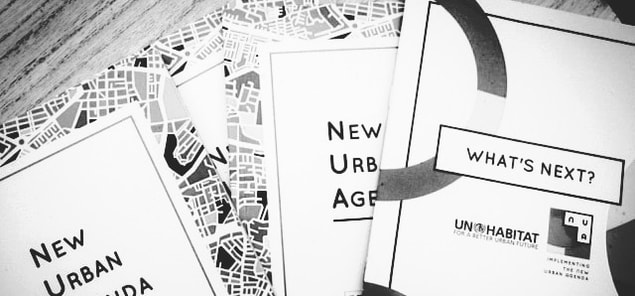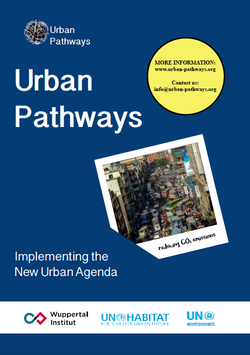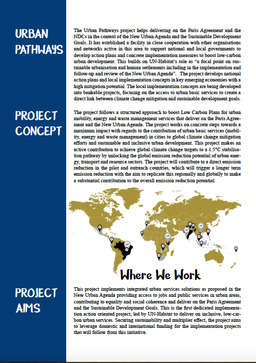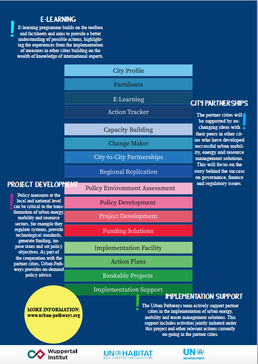The urban pathways Project
On the 12th of December 2015, Parties to the United Nations Framework Convention on Climate Change (UNFCCC) reached a landmark agreement to combat climate change and to accelerate and intensify the actions and investments needed for a sustainable low carbon future in Paris, France – bringing into existence the “Paris Agreement”. The Paris Agreement builds upon the Convention and – for the first time – brings all nations into a common cause to undertake take ambitious efforts to combat climate change and adapt to its effects, with enhanced support to assist developing countries to do so. As such, it charts a new course in the global climate effort. Also in December of 2015, the United Nations General Assembly, in its seventieth session, adopted the resolution on the ‘Implementation of the outcome of the United Nations Conference on Human Settlements (Habitat II) and strengthening of the United Nations Human Settlements Programme (UN-Habitat)’ (A/70/210) , which refers to the United Nations Conference on Housing and Sustainable Urban Development (Habitat III) Conference modalities. The intention of the Habitat III Conference is to reinvigorate the global commitment to sustainable urbanisation and to focus on the implementation of a New Urban Agenda, building on the Habitat Agenda of Istanbul in 1996.
The Urban Pathways project embarked on a four-year programme which started in October 2017. It helped deliver on the Paris Agreement and the NDCs in the context of the New Urban Agenda and the Sustainable Development Goals. Its aim is to make a direct contribution to sustainable urban development by focusing on implementation projects in the areas of mobil-ity, energy, and resource management.
Initially, the Urban Pathways project focused on India, Brazil, Kenya and VietNam as four pilot countries for the implementation of the programme’s identified work agenda. Over the years, it stretched its activities far beyond those countries, being active with pilot projects in 9 cities with replication activities in many more.
The Urban Pathways project had developed and helped to implement a variety of pilot projects for each of the partner cities. During this intense period of cooperation and interaction the team has gained understanding of some of the obstacles and gaps of the regulative framework and / or (lack of) capacities of the partner cities and countries. This report summarizes the lessons learnt, but with a focus on the national level and how the national authorities can help to sup-port low-carbon action in cities.
The Urban Pathways approach starts with rather small-scale, bottom-up activities, believing in the potential of replicating and upscaling such pilot projects. Our experiences highlight-ed the fact that - while material sites and infrastructure of course play an important role - a mindset change is a pivotal precondition for transitioning to sustainable urban development. Thus, small, low-cost projects, such as the EcoZone or Tactical Urbanism, focusing on neigh-bourhoods as the geographical scale can play an important role in speeding up low-carbon urban action. Also, at the neighbourhood level an intersectoral approach is easier applicable, addressing simultaneously different sectors, such as mobility and waste, through a series of activities that include tactical urbanism, awareness-raising, community participation and im-pact assessment.
The Urban Pathways project embarked on a four-year programme which started in October 2017. It helped deliver on the Paris Agreement and the NDCs in the context of the New Urban Agenda and the Sustainable Development Goals. Its aim is to make a direct contribution to sustainable urban development by focusing on implementation projects in the areas of mobil-ity, energy, and resource management.
Initially, the Urban Pathways project focused on India, Brazil, Kenya and VietNam as four pilot countries for the implementation of the programme’s identified work agenda. Over the years, it stretched its activities far beyond those countries, being active with pilot projects in 9 cities with replication activities in many more.
The Urban Pathways project had developed and helped to implement a variety of pilot projects for each of the partner cities. During this intense period of cooperation and interaction the team has gained understanding of some of the obstacles and gaps of the regulative framework and / or (lack of) capacities of the partner cities and countries. This report summarizes the lessons learnt, but with a focus on the national level and how the national authorities can help to sup-port low-carbon action in cities.
The Urban Pathways approach starts with rather small-scale, bottom-up activities, believing in the potential of replicating and upscaling such pilot projects. Our experiences highlight-ed the fact that - while material sites and infrastructure of course play an important role - a mindset change is a pivotal precondition for transitioning to sustainable urban development. Thus, small, low-cost projects, such as the EcoZone or Tactical Urbanism, focusing on neigh-bourhoods as the geographical scale can play an important role in speeding up low-carbon urban action. Also, at the neighbourhood level an intersectoral approach is easier applicable, addressing simultaneously different sectors, such as mobility and waste, through a series of activities that include tactical urbanism, awareness-raising, community participation and im-pact assessment.
Project partners
Un-habitatUN-Habitat is the United Nations programme working towards a better urban future. The Urban Basic Services Branch of UN-Habitat will work with international partners and highly motivated cities in Asia, Africa and Latin America on the implementation of the New Urban Agenda focusing on urban energy, mobility and resources systems. This will build directly on a broad range of activities by UN-Habitat in the respective sectors and on the dedication to sector integration. |
WUPPERTAL INSTITUTEThe Wuppertal Institute will support the project by developing implementation-ready concepts for sustainable urban development, bringing together local demand, technical expertise and policy advice with financing institutions. In close cooperation with a network international project partners, the institute will work on closing the implementation gap between applied research and policy action to foster sustainable urban development in Europe, Asia, Africa and Latin America. |
UN EnvironmentUN Environment will provide technical advice on the effective implementation of the Paris Agreement. It´s mission is to identify emission reduction opportunities, timely and quantified progress towards emission reduction strategies and additional mitigation actions. UNEP will assist by facilitating dialogue with the ministerial level and assessing the implementation readiness of the pilot project concepts as well as helping to identify suitable funding agencies for the scaled-up implementation phase. |
This project is part of the International Climate Initiative (IKI). The Federal Ministry for the Environment, Nature Conservation and Nuclear Safety (BMU) supports this initiative on the basis of a decision adopted by the German Bundestag.











